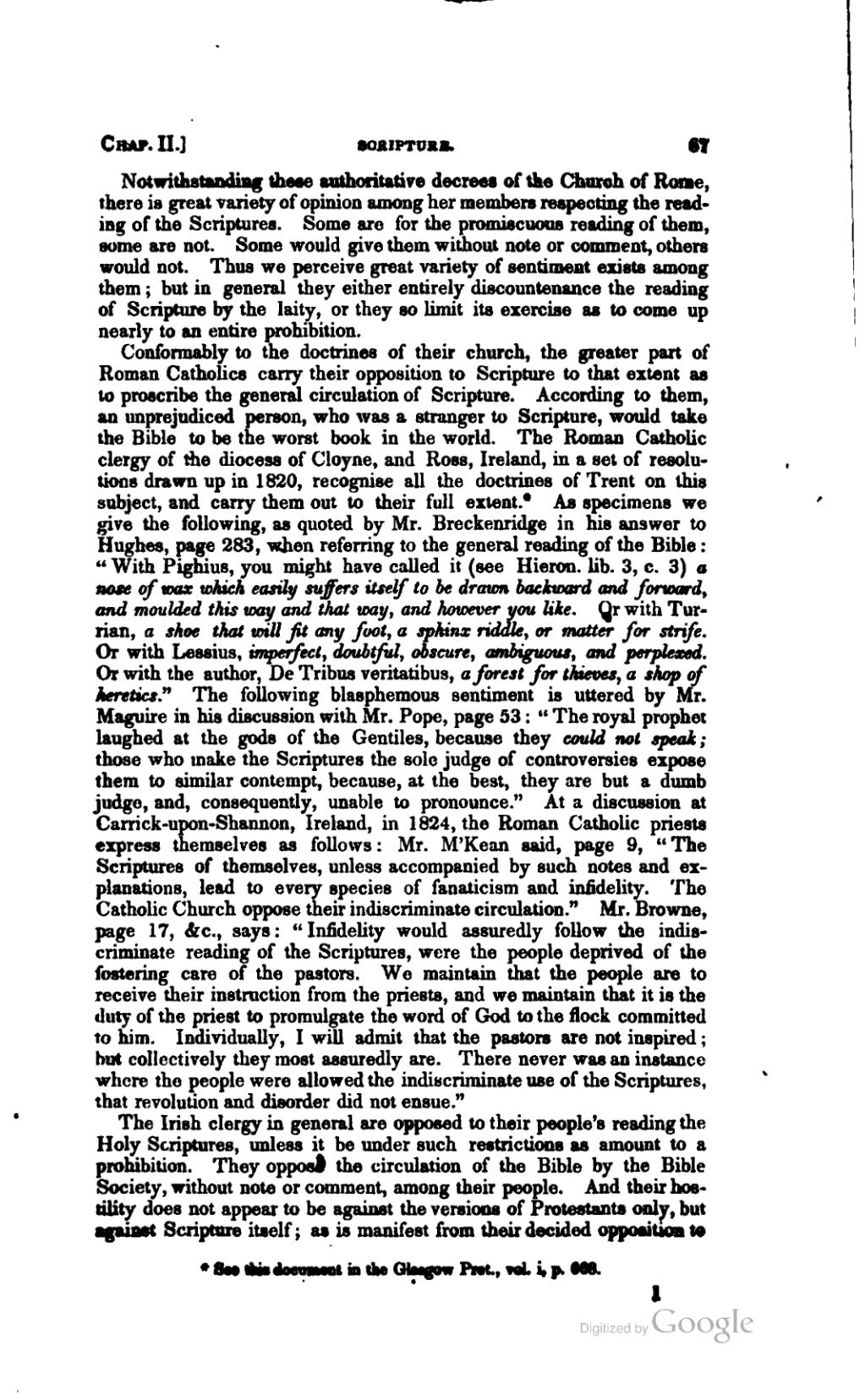H.] smuwvaa. Notwithstanding these amhoritative decrees of tho Churoh of Rome, there is great variety of opinion among her men .?e. rs respecting the read- ing of the Scriptures. Some are for the promrecta)us reading of them, some are not. Some would give them without note or comment, others would not. Thus we perceive great variety of sentiment exists Mnong them; but in general they either entirely discountenance the reading of Scripture by the laity, or they so limit its exercise nn to come up nearly to an entire prohibition. Conformably to the doctrines of their church, the greater part of Roman Catholics carry their opposition to Scripture to that extent as to proscribe the general circulation of Scripture. According to them, an unprejudiced person, who was a stranger to Scripture, would take the Bible to be the worst book in the world. The Roman CathoLic clergy of the diocess of Cloyne, and Ross, Ireland, in a set of rosolu- tions drawn up in 18'20, recognise all the doctrines of Trent on this subject, and carry them out to their full extent." As specimens we give the following, as quoted by Mr. Brackenridge in his answer to Hughes, page 283, w, hun referring to the general reading of the Bible: "With Pighius, you might have called it (see Hieron. lib. 3, c. 3) a ?e of ? ?i? e?ly su?'e?. it. elf to be dra,? bae? and f?, and raouldad ?A? ux:y and ? way, and lunoet, er you ?ke. ?r with Tut- Or with Leasius, ?t, dot?qfd, o?scure, ?, and ?. Or with the author, De Tribus veritatibus, aforeat for tlge?e?, a aiop of ieregc:." The following blasphemous sentiment is uttered by Mr. Maguire in his discussion with Mr. Pope, page 53: "The royal prophet laughed at the gods of the Geutiles, because they could not ?; those who make the Scriptures the sole judge of controversies expose them to similar contempt, because, at the best, they are but a dumb judge, and, consequundy, unable to pronounce." At a discussion at Carrick-upon-Shannon, Ireland, in 1824, the Roman Catholic priests express themselves as follows: Mr. M'Kean said, page 9, "The Scriptures of themselves, unless accompanied by such notes and, ex- planations, lead to every species of fanaticism and inlidelity. Fhe Catholic Church oppose their indiscriminate circulation." Mr. Browne, page 17, &c., says: "Infidelity would assuredly follow the indis- criminate reading of the Scriptures, were the people deprived of the fostering care of the pastors. We maintain that the people are to receive their instruction from the priests, and we maintain that it is the duty of the priest to promulgate the word of God to the flock committed to him. Individually, I will admit that the pastors are not inspired; but collectively they most assuredly are. There never was an irmtance witere the people were allowed the indiscriminate use of the Scripttires, that ?volution and disorder did not ensue." The Irish clergy in general are opposed to their people's reading the Holy Scriptures, unless it be under such restrictions as amount to a prohibition. They oppod the circulation o� the Bible by the Bible ..S?.. iety, without note or comment, among their people. And theiz hes- tility does not appear to be against the versions of Protestants onl?F , but ? Scripmrs itself; as is manifest from their decided oppo?l?m ?
�
